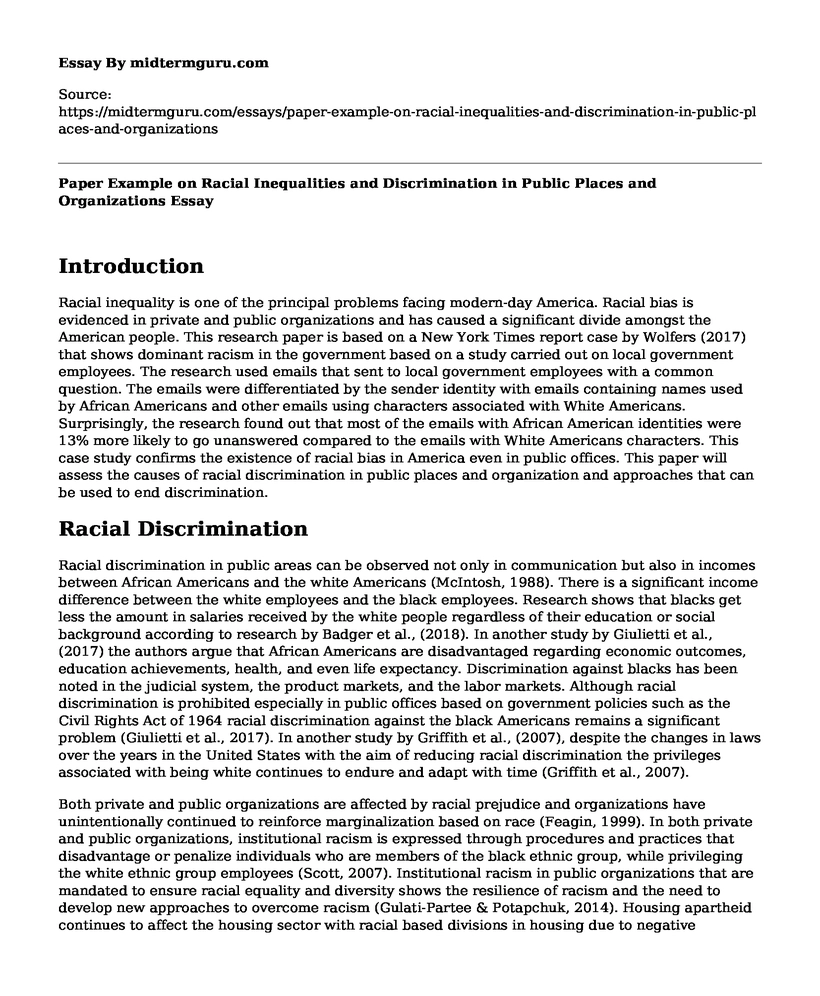Introduction
Racial inequality is one of the principal problems facing modern-day America. Racial bias is evidenced in private and public organizations and has caused a significant divide amongst the American people. This research paper is based on a New York Times report case by Wolfers (2017) that shows dominant racism in the government based on a study carried out on local government employees. The research used emails that sent to local government employees with a common question. The emails were differentiated by the sender identity with emails containing names used by African Americans and other emails using characters associated with White Americans. Surprisingly, the research found out that most of the emails with African American identities were 13% more likely to go unanswered compared to the emails with White Americans characters. This case study confirms the existence of racial bias in America even in public offices. This paper will assess the causes of racial discrimination in public places and organization and approaches that can be used to end discrimination.
Racial Discrimination
Racial discrimination in public areas can be observed not only in communication but also in incomes between African Americans and the white Americans (McIntosh, 1988). There is a significant income difference between the white employees and the black employees. Research shows that blacks get less the amount in salaries received by the white people regardless of their education or social background according to research by Badger et al., (2018). In another study by Giulietti et al., (2017) the authors argue that African Americans are disadvantaged regarding economic outcomes, education achievements, health, and even life expectancy. Discrimination against blacks has been noted in the judicial system, the product markets, and the labor markets. Although racial discrimination is prohibited especially in public offices based on government policies such as the Civil Rights Act of 1964 racial discrimination against the black Americans remains a significant problem (Giulietti et al., 2017). In another study by Griffith et al., (2007), despite the changes in laws over the years in the United States with the aim of reducing racial discrimination the privileges associated with being white continues to endure and adapt with time (Griffith et al., 2007).
Both private and public organizations are affected by racial prejudice and organizations have unintentionally continued to reinforce marginalization based on race (Feagin, 1999). In both private and public organizations, institutional racism is expressed through procedures and practices that disadvantage or penalize individuals who are members of the black ethnic group, while privileging the white ethnic group employees (Scott, 2007). Institutional racism in public organizations that are mandated to ensure racial equality and diversity shows the resilience of racism and the need to develop new approaches to overcome racism (Gulati-Partee & Potapchuk, 2014). Housing apartheid continues to affect the housing sector with racial based divisions in housing due to negative prejudicial attitudes, which consider African Americans less worthy (De Leeuw et al., 2007 and Schwemm, 2006). In public offices, as noted in the cases study, discrimination is also based on individual attitudes of white ethnic employees who consider the African Americans less deserving their attention.
Conclusion
Racial prejudice in public organizations is a significant problem that should be addressed to promote ethnic diversity and cohesion. Government intervention is necessary through policies that sanction severe punishments and categorizing racial bias as an abuse of office. The government should require government institutions to establish internal procedures that outlaw racial prejudice and educate employees internally on the need for ethnic cohesion which can help eradicate deep-rooted prejudiced attitudes amongst the white Americans. The government should create policies that ensure equal salaries irrespective of race to reduce race-based pay prejudice by public organizations and institutions.
References
Badger, E., Miller, C. C., Pearce, A., & Quealy, K. (2018, March 19). Extensive Data Shows Punishing Reach of Racism for Black Boys. Retrieved from https://www.nytimes.com/interactive/2018/03/19/upshot/race-class-white-and-black-men.html
De Leeuw, M. B., Whyte, M. K., Ho, D., Meza, C., & Karteron, A. (2007). Residential Segregation and Housing Discrimination in the United States. Poverty & Race Research Action Council. December.Feagin, J. R. (1999). Excluding blacks and others from housing: The foundation of white racism. Cityscape, 79-91.
Giulietti, C., Tonin, M., & Vlassopoulos, M. (2017). Racial Discrimination in Local Public Services: A Field Experiment in the United States. Journal of the European Economic Association.
Griffith, D. M., Childs, E. L., Eng, E., & Jeffries, V. (2007). Racism in organizations: The case of a county public health department. Journal of Community Psychology, 35(3), 287-302.
McIntosh, P. (1988). White privilege: Unpacking the invisible knapsack.
Gulati-Partee, G., & Potapchuk, M. (2014). Paying attention to white culture and privilege: A missing link to advancing racial equity. The Foundation Review, 6(1), 4.
Schwemm, R. G. (2006). Why do landlords still discriminate (and what can be done about it)? J. Marshall L. Rev., 40, 455.
Scott, C. L. (2007). A Discussion of Individual, Institutional, and Cultural Racism, with Implications for HRD. Online Submission.
Wolfers, J. (2017, October 06). Pinpointing Racial Discrimination by Government Officials. Retrieved from https://www.nytimes.com/2017/10/06/business/economy/racial-discrimination-government-officials.html
Cite this page
Paper Example on Racial Inequalities and Discrimination in Public Places and Organizations. (2022, Sep 06). Retrieved from https://midtermguru.com/essays/paper-example-on-racial-inequalities-and-discrimination-in-public-places-and-organizations
If you are the original author of this essay and no longer wish to have it published on the midtermguru.com website, please click below to request its removal:
- Research on Unemployment in Detroit
- Research Paper on Discrimination and Racism Against the Muslims
- Essay Sample on Teenage Pregnancy in Rural Areas
- Dallas DA Takes Positive Step: Dismissing First-Time Marijuana Cases - Essay Sample
- My Identity Privilege: Benefits & Shaping My Life - Essay Sample
- Feminism: Overcoming Male-Centric Society & Misconceptions - Essay Sample
- The Debate on Physical-Assisted Suicide - Essay Sample







